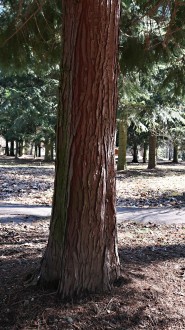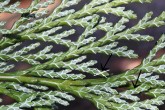(Chamaecyparis lawsoniana (A. Murray) Parl.)
Habitus
- tree 40 - 60 m tall, crown narrow, conical, deeply rooted
- terminal shoot (top) overhanging !
- bork reddish-brown, peels off in round, irregular to oblong scales, forms longitudinal strips in old age
Leaves (assimilation organs)
- assimilation organs scaly in two opposite pairs
- the central one is oblong-ovoid, has an oblong gland, the lateral ones are sharply pointed, the tip slightly protrudes
- on the underside they have silvery rimmed edges that create an "X" pattern
- the upper side is monochromatic, bluish-green
Fruits – seeds
- the fruit is a cone, spherical, approx. 8 mm in size with eight seed scales, which have a short curved tip in the middle.
Extension
- origin - the western part of the North American continent in a relatively small area of southwestern Oregon and northwestern California
- forming mixed stands with several conifers (Douglas yew (Pseudotsuga menziesii), Canadian hemlock (Tsuga canadensis), thuja ciliate (Thuja plicata), ...)
- in the territory of Slovakia occurs only as a cultivated species
Ecology
- tolerates shade when young, later it is a semi-photophilous tree
- sensitive to frost
- grows best on lighter, moist soils
Significance
- ornamental park tree
- creates many growth and color forms








